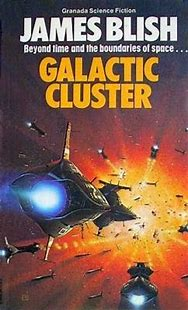The Technic History is a single long linear future history series whereas the Haertel Scholium is a shorter sequence of non-linear future historical writings. Thus, characters in alternative futures refer back to the common figure of Adolph Haertel.
Future histories often begin terrestrial or Solar, then go interstellar. Robert Heinlein's five-volume Future History goes interplanetary at the end of Volume I and interstellar in Volume IV. The Technic History began interstellar with the Grand Survey and the Discovery of Ythri but then acquired an earlier instalment about the exploration of the Saturnian System. The Haertel Scholium began interstellar with a test flight of the Haertel overdrive, then acquired a juvenile novel about Haertel's antigravity flight to Mars.
The Technic History incorporates a space secret service series featuring Dominic Flandry. The Haertel Scholium includes a single space secret service story, "Beep"/The Quincunx of Time.
The Haertel Scholium incorporates mental time-projection from 1985 to 25,000 and a world-line cruiser travelling from 8873 to 8704 whereas Anderson mixes time travel with future history not in his Technic History but in his Maurai History.
At the culmination of the Technic History, the conflict between the Terran Empire and the Merseian Roidhunate has ended and human civilizations have spread through several spiral arms of the galaxy. In divergent branches of the Haertel Scholium:
a conflict is just beginning between the Terrestrial Matriarchy and the telepathic Central Empire;
Earth awaits membership of the Heart Stars federation;
a conflict is just beginning between the Earthmen/Angels alliance and the Heart Stars/Hegemony of Malis;
there is a long conflict between High Earth and the Green Exarchy;
a utopian civilization spreads between galaxies;
a time-projected astrophysicist and a preserved intellect experience a mystical immortality;
A Case of Conscience is both a Haertel Scholium novel and Volume III of the After Such Knowledge Trilogy.
My message to Anderson fans: read Blish too.

1 comment:
Kaor, Paul!
I dunno, Blish's works seem to have fallen into obscurity since his death in 1975. I probably have more of his stories than most SF fans do these days: the Flying Cities books, the After Such Knowledge triad, and some of his short stories. But when I tried to reread the Flying Cities books some years ago, I gave up after the second volume, because they were not grabbing my interest.
My point being, rightly or wrongly, most of Blish's works don't interest many readers. Not all, IMO. Some, like A CASE OF CONSCIENCE, seems to be of permanent interest.
Ad astra! Sean
Post a Comment